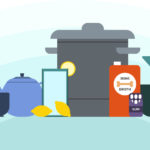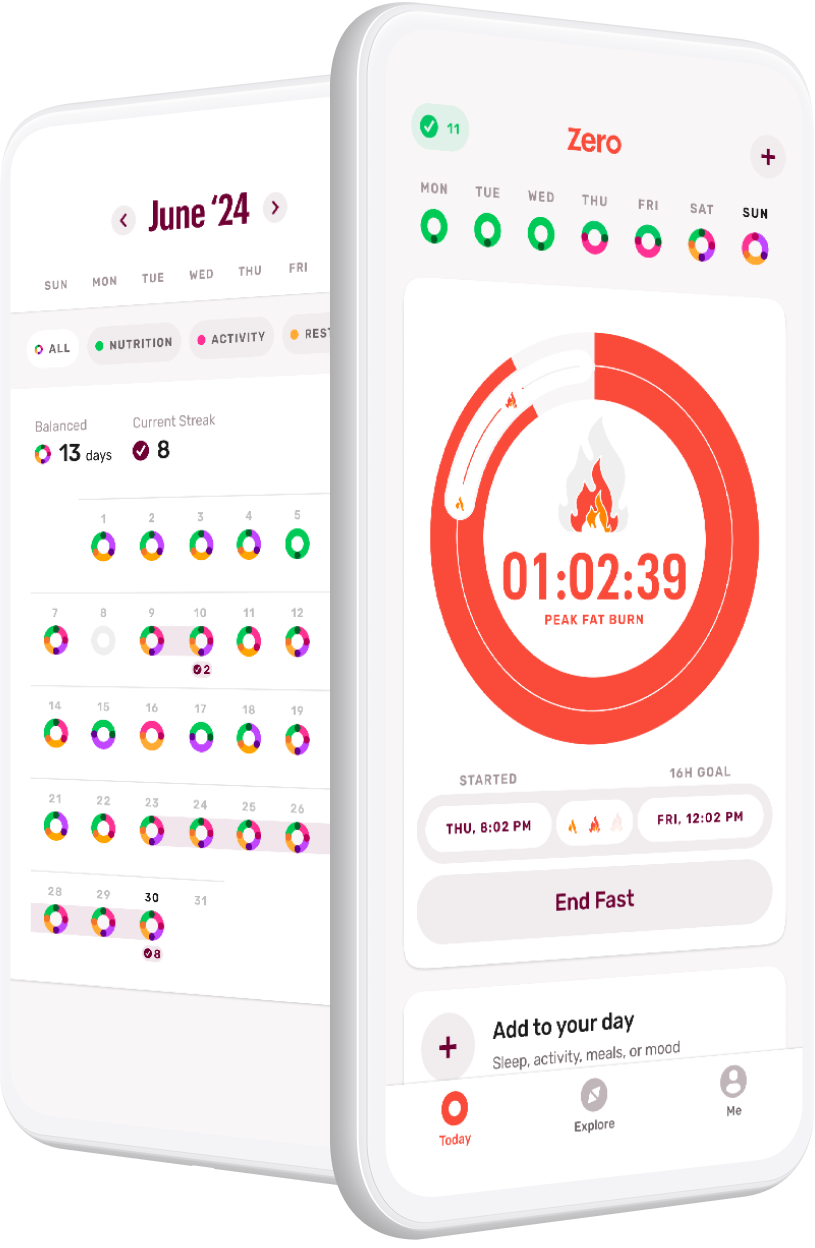Written and medically reviewed by Rich LaFountain, PhD
This is part 2 of our electrolytes series. Read Part 1: Why You Need Magnesium on a Fast
Like magnesium, Sodium is an essential nutrient, meaning you have to get it from food or supplements; your body can’t make it on its own.
Your body needs sodium to maintain fluid volume and blood pressure, transport other nutrients, keep your muscles contracting and functioning properly, and send signals from your nervous system.
When carbohydrates are restricted or removed from the diet, your kidneys start to excrete more sodium and, along with it, extra fluid.
The increased sodium losses can be explained by increased excretion of ketone bodies, as well as the increase in glucagon and decrease in insulin levels.
Symptoms of Low Sodium
Common symptoms of low sodium levels include headaches, lightheadedness, dizziness, fatigue, nausea, and muscle cramps.
If you’re one of those people who gets headaches when they fast, it’s likely due to one of two things:
- Caffeine withdrawal (if you’ve cut out coffee)
- An electrolyte deficiency.
Similarly, if you’re battling fatigue, it would be easy to attribute that feeling to your lack of food, but it may actually be due to lack of sodium… which is good news, because you can supplement with sodium without breaking your fast.
Supplementation
The federal guidelines for sodium consumption set a limit at 2,300 mg daily, but others have argued that ~3500 mg is closer to what our bodies actually need.
During times of food deprivation, studies have shown negative sodium balance usually occurs on the 2nd day of a fast.
But sodium excretion from the kidneys can start as soon as your fast begins. In one study, cumulative sodium loss was estimated at 7,475 mg over 7 days with a daily peak urinary sodium loss of 1,564 mg on day 3.
So, 2-3 grams of sodium per day is probably a good starting point for supplementation during a fast.
For context, there’s about 1.7 grams of sodium in a teaspoon of pink himalayan sea salt, and a little over 1 gram of sodium in a typical serving of bouillon (half a cube).
If you exercise during your fast, you may need even more sodium to compensate for what you lose to sweat.
Volek and Phinney recommend that you consume one additional gram of sodium within the hour before exercise to account for any extra losses.
So, to keep our math up to date: if you’re exercising during a fast, that would mean 3-4 grams of sodium per day, with a gram of that being consumed before you work out.
You can supplement with sodium however you like so long as the calories remain minimal. The most common forms include bouillon, mineral water, and salt tabs.
A lot of us at Zero like a mug of low-calorie bouillon at mealtimes to replace the ritual of food. We’ve also been known to chew on pink Himalayan salt crystals to give our teeth something to do.
When You Shouldn’t Supplement with Sodium
It’s important to note that there are certain populations who should tread a bit more cautiously with sodium.
No matter why you’re fasting, it’s a good idea to discuss your diet and supplements with your healthcare provider.
Where sodium is concerned, it’s especially important if you have a history of kidney disease, blood pressure issues, heart failure, or if you’re pregnant or on diuretics.
The Bottom Line
Supplementing with magnesium and sodium can make your fast a lot happier.
For magnesium, you’ll likely want to supplement just above 100% of the RDA.
You’ll also want several different molecular forms including one or two types of slow-release mag (you may see this on the label as ZumXR or Sucrosomial Magnesium) to maintain a steady drip of magnesium in your bloodstream, and to avoid any GI distress.
For sodium, you’ll want 2-3g per fasting day if you’re not exercising, and 3-4g if you are.
4g is about 4 servings (or two whole cubes) of bouillon, depending on the brand, or 2.5 tsp of pink himalayan Sea salt.
If you’re exercising, have a mug of bouillon or chew on a few salt crystals in the hour before your workout.
- Debunking 3 Myths Around Fasting and Thyroid Health - April 15, 2024
- Breaking Down Fast Breakers: How to Tell If Something Will Break Your Fast - March 4, 2024
- GLP-1s and Weight-Loss Medications vs. Lifestyle Interventions: What’s Right for You - February 5, 2024



Great write up. Even when not fasting sodium is way overlooked and gets a bad rap. Being keto and fasting for 25 yrs- I consume 8gm a day easily and feel great. Keep up these great articles!
Do you just consume salt crystals? How do you supplement?
That is way too much sodium and will result in significant problems for most people.
I learned the hard way when I did intermittent fasting with bulletproof coffee many years ago. Felt good mentally but physically exhausted, thirsty, cramping. It was like I was running on pure adrenaline and felt like I was stressing my body out too much. Finally got used to it. Then incorporated electrolytes for good measure.
Greg,
I’m on day 5 of a fast now. Not consuming enough sodium/magnesium/electrolytes, though im workng to remedy that now. I feel exactly the way you just described. Mentally, I feel super sharp, and I have tons of energy. I’ve also been staying up later and waking up early, so getting less sleep.
What would you recommend for me based on your experience? Could you tell more about how you “got used to it”?
Agree. Great articles on magnesium and sodium. Has made a huge difference to my IF routines since I upped both. Will purchase different magnesium next time though. Thank you zero fasting
Which supplements are allowed on IF? Or do you take them when you break your fast?
Great articles! I had no idea about it myself. Very informative. I’ll definitely start using magnesium & sodium during and/or before my fasting. And keep myself hydrated. Thank you!
Great article, just curious if supplements should be taken during my feeding window or during my fasting period. Will it break a fast? I usually exercise/surf early in the morning while fasting.
If you use the method of drinking buillion or adding salt to food, it will break a fast. But chewing the crystals or adding salt to water will not break your fast.
If you notice you have enough energy during the day and while exercising, it doesn’t really matter much when you supplement. But if you notice you’re dizzy or tired, I would recommend supplementing before you normally notice the symptoms, whether it’s before exercising or during the day.
I had the same question – thanks for asking.
I assumed this was true but should have been more proactive on my recent fast as I had an incident with vertigo that coulda gone really sour.
Now I know for next time!
Thanks for the article.
Any suggestions on salt tabs and boil lion cubes to buy? I have some Himalayan salt but I like to have options
I’m trying to understand if the article suggests consuming Himalayan salt crystals. How have you proceeded?
Ketorade: water with pink salt, lemon juice and apple cider vinegar. A teaspoon of salt, tablespoon of each fliquid or about 2 quarts of water. Tasty too, especially when your body calls for salt.
From my understanding of the article, salt in any form is what they mean. Whether it’s in broth (which will break a fast, but it all depends on if you’re fasting for weight loss or health benefits), dissolved in water, chewing crystals, or adding it to food.
Does ketorade break your fast , when should I drink it?
Thank you Margaret for Ketorade Recipe!!!!!
Good articles. I’m looking forward to the one about POTASSIUM! It’s allegedly the hardest electrolyte to fulfil RDAs, even with supplements, albeit also being said to be the most important one….
I agree! Cant have the sodium without the potassium balance.
Simply buy No Salt as that is potassium.
I don’t feel like “multiple types of magnesium supplements” gives me enough information. I read both of your electrolyte articles. Multiple magnesium supplements, including more than one slow release kind, seems frankly silly to me. At least can you tell me why one slow release type is not sufficient? What about one slow release and one regular? How many types should I be taking then?
Also, what if I just ate a spoonful of the iodized salt that’s already in my kitchen, why does it have to be pink Himalayan salt?
Read the magnesium article. That will answer your question.
Fresh coconut water is great.
What about magnesium spray?
Good idea?! Love coconut water!!!
Do supplements like magnesium and sodium break your fast? What’s the best moment of the day to take them?
No they will not break your fast taking them by themselves (if you add the salt to food or drink buillion for salt, then yes it will break a fast).
Now, I remember when my mom was in hospital for 30 days fasting, due to her extra-weight ( actually to cure asthma )
she was constantly drinking mineral water, now I see why, and it worked!
I have a string aversion to salt water, or chewing salt. Any suggestions for a way to increase salt intake and not breaking fast ?
I have menieres disease and have been told not to have more that 1.5g of salt a day what else can I use to help me through my fast?
Such a great read. Thank you for the essential information everyone needs to know.